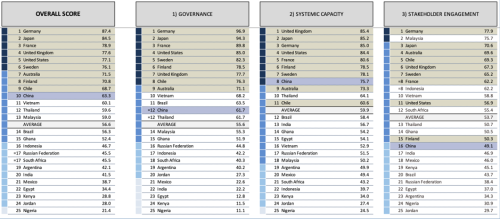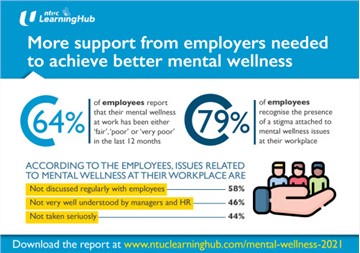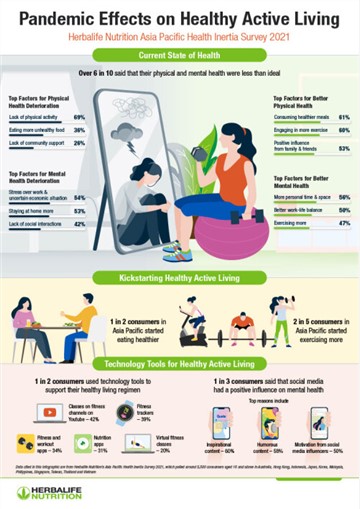
Contents Provided by Media OutReach
- Europe leads in global plastics management efforts, while Asia lags—despite producing half the world's plastics
- The top performers in each region are: Middle East and Africa: Ghana (15th); South America: Chile (9th); Europe: Germany (1st); and Asia-Pacific: Japan (2nd)
- The US generates more plastic waste than any other country globally, followed by the EU, India and China
- Most lower-middle income countries struggle across the board—although Vietnam (11th) and Ghana (15th) outperformed
- China (10th), the world's largest plastics producer, is developing the capacity to manage plastics but lags on stakeholder engagement
- Latin American nations rank in the middle to lower end of the index and are weakest in the stakeholder engagement category
TOKYO, JAPAN - Media OutReach - 5 October 2021 - Back to Blue, an ocean health initiative of Economist Impact and The Nippon Foundation, today releases the first edition of its Plastics Management Index (PMI). The index ranks 25 countries worldwide across five continents, assessing the capacity of a country to minimise plastics mismanagement while promoting the optimal production and use of plastic as a resource. The index comprises three pillars - governance, existing systemic capacity, and stakeholder engagement —measured across 12 indicators and 44 individual sub-indicators.
The world produces and uses more plastic each year, with 367 million metric tonnes manufactured in 2020. With production forecast expected to double by 2040, plastic is not the world's only pollution challenge, but it is arguably the most prominent. The scale of the challenge demands a new framework that covers the entire lifecycle of plastic products—from design to production to consumption to disposal and beyond. The PMI is designed to bring attention to growing global concerns around the use of plastic, highlighting how its management can be made sustainable.
The report reveals that Germany is the top performer overall in plastics management, scoring 87 points out of 100. Ranking first for governance and stakeholder engagement and third for systemic capacity, this is largely due to the country's recycling scheme by the government and industries that have resulted in a circular economy for plastics.
Despite producing half the world's plastics, Asia lags in global plastics management efforts as compared to Europe. Europe leads the overall ranking largely thanks to the proactivity of the European Union and the region's ability to fund innovation and research. Asia-Pacific countries largely comprise the middle of the table, followed by Latin American nations and those in Africa.
Naka Kondo, editor of the PMI report, Policy and Insights at Economist Impact, says:
"We have created the Plastics Management Index as a new benchmark for measuring how countries are coping with plastics from cradle to grave--just as the need, and interest, globally builds for managing plastics across their entire lifecycle, rather than with piecemeal approaches such as plastic bag bans. Quite a few countries continue to struggle, though the index identifies real currents of hope. But equally, just because countries appear to be performing well does not mean they are doing enough to address the issues."
Yohei Sasakawa, chairman of The Nippon Foundation states:
"The path the world is on with plastics is plainly unsustainable. Already plastics leakage is doing untold damage to our ocean. The scale of the challenge is startling, and in urgent need of cohesive and effective solutions that can address every element of the complex lifecycle of plastics. The Plastics Management Index, I hope, will shed light on where we are globally, and where we need to be headed to manage plastics more effectively and responsibly."
Overall ranking

The top performers in each pillar are as follows:
Governance: Germany (1), Japan (2), France (3), US (4), Sweden (5)
Systemic capacity: UK (1), Japan (2), Germany (3), US (4), France (5)
Stakeholder engagement: Germany (1), Malaysia (2), Japan (3), Australia (4), Chile (5)
Visit backtoblueinitiative.com for the full report, data workbook and interactive tool
About the Plastics Management Index
The PMI centres around three pillars, the system of governance, existing systemic capacity and stakeholder engagement. It ranks 25 countries across 12 indicators and 44 sub-indicators. For more on the index methodology, please see the methodology appendix at the end of the report. Please visit backtoblueinitiative.com for the white paper, interactive tool to explore the rankings and the index data workbook.
The 25 countries selected for the index are:
Argentina | Egypt | India | Malaysia | Sweden |
Australia | Finland | Indonesia | Mexico | Thailand |
Brazil | France | Japan | Nigeria | UK |
Chile | Germany | Jordan | Russia | US |
China | Ghana | Kenya | South Africa | Vietnam |
About Economist Impact
Economist Impact combines the rigour of a think-tank with the creativity of a media brand to engage a globally influential audience. We believe that evidence-based insights can open debate, broaden perspectives and catalyse progress. The services offered by Economist Impact previously existed within The Economist Group as separate entities, including EIU Thought Leadership, EIU Public Policy, EIU Health Policy, Economist Events, EBrandConnect and SignalNoise.
We are building on a 75 year track record of analysis across 205 countries. Along with framework design, benchmarking, economic and social impact analysis, forecasting and scenario modelling, we provide creative storytelling, events expertise, design-thinking solutions and market-leading media products, making Economist Impact uniquely positioned to deliver measurable outcomes to our clients.
#EconomistImpact
About The Nippon Foundation
Established in 1962, The Nippon Foundation is Japan's largest philanthropic foundation, providing support to public-service activities in a variety of fields across national borders. In ocean affairs, the Foundation aims to cultivate human resources who will chart a course for the ocean's future and to pass on the ocean's riches to future generations. Other primary areas of activity include support for children, persons with disabilities, disaster relief, and international cooperation, with the ultimate goal of achieving a society where all people support one another.























Latest comments